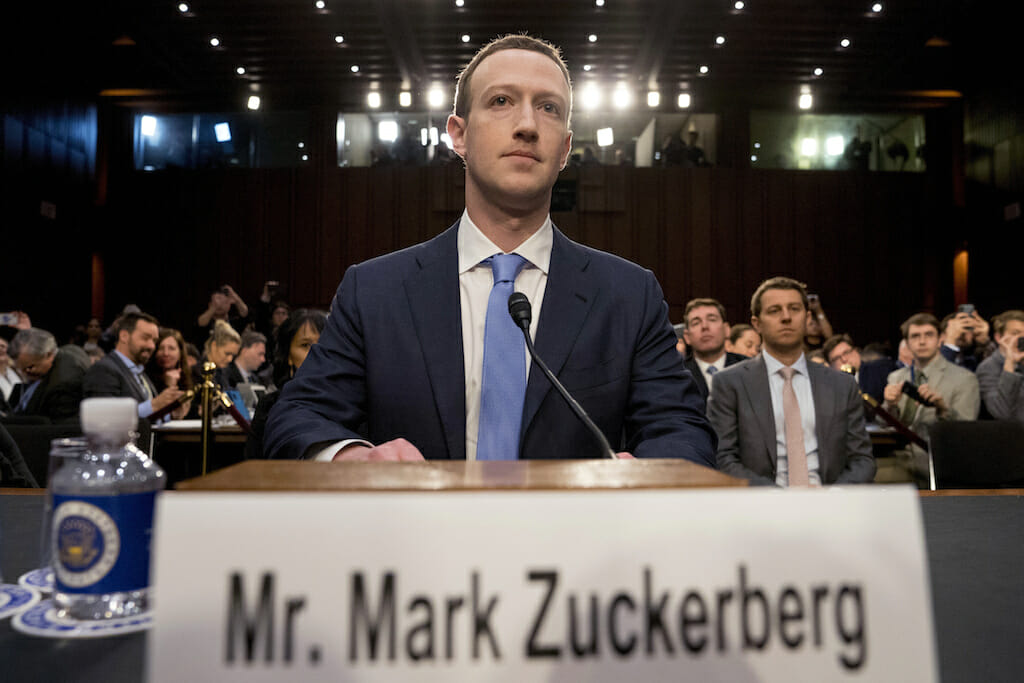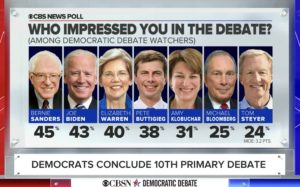Lawsuit: Facebook Used Faulty Data to Convince Publishers to Go All In on Video
Video content may not be nearly as lucrative as the social network led media companies to believe. Facebook CEO Mark Zuckerberg testifies at a joint hearing of the Commerce and Judiciary committees on Capitol Hill. (Andrew Harnik / AP)
Facebook CEO Mark Zuckerberg testifies at a joint hearing of the Commerce and Judiciary committees on Capitol Hill. (Andrew Harnik / AP)
In 2016 and 2017, media companies were convinced video content was the wave of the future. Facebook CEO Mark Zuckerberg told BuzzFeed News, “We’re entering this new golden age of video.” Facebook’s vice president for Europe, Nicola Mendelsohn, concurred, telling a panel at a Fortune conference in 2016: “We’re seeing a massive increase, as I’ve said, on both pictures and video. So I think, yeah, if I was having a bet, I would say: Video, video, video.”
Companies acted accordingly. Barely two years after hiring multiple writers and editors to focus on long-form written content, MTV News laid off many of those much-heralded staffers, saying that while it was proud of its long-form content, the company was “shifting resources into short-form video content more in line with young people’s media consumption habits.” Outlets like Mic.com and others followed, hoping that video content was a magic bullet for lifting flagging page views and revenue.
A new lawsuit filed this week by a group of advertisers in California, however, claims that Facebook knew for years that its data on video was faulty, and, as Laura Hazard Owen reports in NiemanLab, “[the lawsuit] argues that Facebook had known about the discrepancy for at least a year—and behaved fraudulently by failing to disclose it.”
Owen reports that the signs were there even before the layoffs, and quotes a Wall Street Journal piece from 2016 that said Facebook “vastly overestimated average viewing time for video ads on its platform for two years by as much as 60 to 80 percent.”
Facebook, Owen notes, apologized in a blog post: “As soon as we discovered the discrepancy, we fixed it.”
Owen read the lawsuit to attempt to determine “whether people working in news organizations were fired based on faulty data provided by a giant platform that publishers believed they could trust.”
She writes that “[t]he lawsuit alleges that Facebook engineers knew for over a year” that the company’s metrics were ‘overstating the average time its users spent watching paid video advertisements,’ and that ‘multiple advertisers had reported aberrant results caused by the miscalculation (such as 100% watch times for their video ads.’ ”
“The suit alleges,” Owens goes on to explain, “that there was a long lag between the time that the engineers realized the metrics were faulty and the time that Facebook corrected them, due to understaffing on the engineering team,” and, as the suit itself notes:
Even once Facebook decided to correct the false metrics, it chose not to do so immediately. Instead, Facebook chose to continue disseminating false metrics for several more months while it developed and deployed a ‘no PR’ strategy designed to ‘obfuscate the fact that we screwed up the math.’ All the while, Facebook continued to reap the benefits from the inflated numbers.
Though Owen is cautious to say that we may never know the exact correlation between Facebook’s faulty data and news organizations’ hiring and firing decisions, based on her own analysis of the court documents, she concludes that:
What does seem clear now is that Facebook’s executives’ statements about video should not have been a factor in news publishers’ decisions to lay off their editorial staffs. But it’s hard not to conclude that publishers heard that rhapsodizing about the future and assumed that Facebook knew better than they did, that Facebook’s data must be more accurate than their own data was, that Facebook was perceiving something that they could not. That their own eyes were wrong.
Read Owen’s analysis, including excerpts from the court documents, here.
Your support matters…Independent journalism is under threat and overshadowed by heavily funded mainstream media.
You can help level the playing field. Become a member.
Your tax-deductible contribution keeps us digging beneath the headlines to give you thought-provoking, investigative reporting and analysis that unearths what's really happening- without compromise.
Give today to support our courageous, independent journalists.






You need to be a supporter to comment.
There are currently no responses to this article.
Be the first to respond.